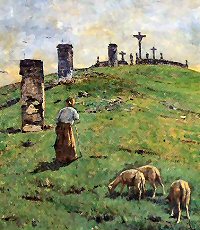“Stop bullying, knowing that both they and you have a Master in heaven and that with him there is no partiality.” (Ephesians 6:9)
The Letter to the Ephesians was written during a period when at least one out of every three people in the Roman Empire was a slave. Slavery was an accepted institution that supported the social and economic structures of the culture. Sadly, slaves were considered tools of their masters and had few personal rights. Since slave owners exercised absolute mastery over their human property, some treated their slaves with vicious cruelty.
In his work with the church in Ephesus, Paul never endorsed slavery nor advocated its overthrow. He had a different objective: to enlighten everyone about the fundamental dignity of every human person. Since both slave and master “have a Master in heaven” (Ephesians 6:9), they are equal in status before the Lord. So Paul directed slaves to see themselves as children and heirs of God and to do their work as if for the Lord. Because it was proclaimed to both masters and slaves, this new perspective opened the way to an eventual rethinking of the institution of slavery—even as it gave oppressed slaves an immediate sense of dignity and purpose.
Also revolutionary was Paul’s assertion that within the Christian household, slaves had rights and that masters had a responsibility before God to treat them with justice and kindness. In his Letter to Philemon, Paul even appeals in love to the Christian owner of a runaway slave. He asks the master to welcome the runaway back “no longer as a slave but more than a slave, a brother” (Philemon 16)!
While the spread of Christianity in the first few centuries did not immediately lead to the abolition of slavery, it did set in motion the forces that eventually resulted in the widespread freeing of slaves. Pondering the gospel, Christians came to understand slavery as a grave injustice. Today in many parts of the world, slavery continues to grieve God’s heart. Let’s do all we can to fight this injustice. Let’s also pray that more people will take on the mind of Christ, which changes the world by changing hearts.
“Lord Jesus please rescue all who are enslaved. Send messengers of your gospel to all who engage in slavery.”
Psalm 145:10-14; Luke 13:22-30

 or All Hallows' Eve is not a liturgical feast on the Catholic calendar, but the celebration has deep ties to the Liturgical Year. These three consecutive days — Halloween, All Saints Day and All Souls Day — illustrate the Communion of Saints. The Church Militant (those on earth, striving to get to heaven) pray for the Church Suffering (those souls in Purgatory) especially on All Souls Day and the month of November. We also rejoice and honor the Church Triumphant (the saints, canonized and uncanonized) in heaven. We also ask the Saints to intercede for us, and for the souls in Purgatory.
or All Hallows' Eve is not a liturgical feast on the Catholic calendar, but the celebration has deep ties to the Liturgical Year. These three consecutive days — Halloween, All Saints Day and All Souls Day — illustrate the Communion of Saints. The Church Militant (those on earth, striving to get to heaven) pray for the Church Suffering (those souls in Purgatory) especially on All Souls Day and the month of November. We also rejoice and honor the Church Triumphant (the saints, canonized and uncanonized) in heaven. We also ask the Saints to intercede for us, and for the souls in Purgatory.